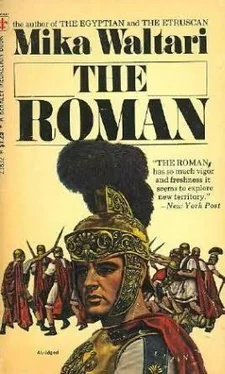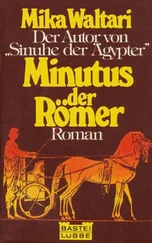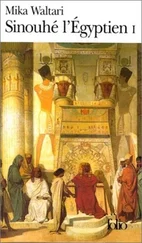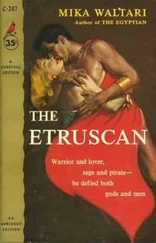Mika Waltari - The Roman
Здесь есть возможность читать онлайн «Mika Waltari - The Roman» весь текст электронной книги совершенно бесплатно (целиком полную версию без сокращений). В некоторых случаях можно слушать аудио, скачать через торрент в формате fb2 и присутствует краткое содержание. Жанр: Исторические приключения, на английском языке. Описание произведения, (предисловие) а так же отзывы посетителей доступны на портале библиотеки ЛибКат.
- Название:The Roman
- Автор:
- Жанр:
- Год:неизвестен
- ISBN:нет данных
- Рейтинг книги:4 / 5. Голосов: 1
-
Избранное:Добавить в избранное
- Отзывы:
-
Ваша оценка:
- 80
- 1
- 2
- 3
- 4
- 5
The Roman: краткое содержание, описание и аннотация
Предлагаем к чтению аннотацию, описание, краткое содержание или предисловие (зависит от того, что написал сам автор книги «The Roman»). Если вы не нашли необходимую информацию о книге — напишите в комментариях, мы постараемся отыскать её.
The Roman — читать онлайн бесплатно полную книгу (весь текст) целиком
Ниже представлен текст книги, разбитый по страницам. Система сохранения места последней прочитанной страницы, позволяет с удобством читать онлайн бесплатно книгу «The Roman», без необходимости каждый раз заново искать на чём Вы остановились. Поставьте закладку, и сможете в любой момент перейти на страницу, на которой закончили чтение.
Интервал:
Закладка:
Claudia let her hands rest on my shoulders and breathed warmly on my face.
“Promise me, Minutus,” she said, “that you’ll come and see me when you’ve received the man-toga.”
I mumbled that even then I should have to obey my father. But Claudia persisted.
“Now you’ve kissed me,” she said decisively, “you’re bound to me in some way.”
She bent down and hunted for her shoes in the darkness. Then she patted my cold cheek and hurried away. I called after her that I felt in no way bound to her as she had forced her kisses on me, but Claudia had vanished into the night. The wind carried the groans of the sick from the island, the water swirled ominously and I hurried home as quickly as I could. Barbus had searched for me at the library and the forum in vain and was furious with me, but he had not dared tell Aunt Laelia that I had disappeared. Fortunately my father was late as usual.
The following day I asked Aunt Laelia in a roundabout way about Claudia. I told her I had met Claudia Plautia at the library and given her a quill. Aunt Laelia was appalled.
“Don’t you ever get mixed up with that shameless girl,” she said. “Better to run away if you see her again. Emperor Claudius has many times regretted not drowning her, but at the time he didn’t yet dare do such things. The girl’s mother was a big fierce woman. Claudius was afraid of the consequences if he had got rid of the girl. To annoy Claudius, Emperor Gaius would always call Claudia his cousin and I think he dragged her into his immoral life too. Poor Gaius even slept with his own sisters because he thought he was a god. Claudia isn’t received in any of the respectable houses. Anyhow, her mother was killed by a famous gladiator and he wasn’t even prosecuted because he could prove that he was only defending his virtue. Urgulanilla became more and more violent in her love affairs as the years went by.”
I soon forgot Claudia, for my father took me with him to Caere and we stayed there for a month in the winter while he saw to his property. The huge burial mounds of former Etruscan kings and nobles in their countless numbers on each side of the sacred road made a deep impression on me. When the Romans had captured Caere hundreds of years before, they had plundered the old tombs, but there were some large, more recent mounds untouched beside the road. I began to feel respect for my own ancestors. Despite everything my father had told me, I had not imagined that the Etruscans had been such a great people. From Emperor Claudius’ book one could not imagine the melancholy exaltation of these royal tombs. One has to see them with one’s own eyes.
The inhabitants of this now poverty-stricken city avoided going to the burial ground at night and maintained that it was haunted. But in the daytime, travelers walked here to look at the ancient mounds and relief carvings in the plundered tombs. My father took the opportunity to make a collection of old bronze miniatures and holy black clay bowls which the local people found when plowing and digging wells. Collectors had of course already taken away the best bronzes in the time of Augustus, when it was fashionable to collect Etruscan objects. Most of the statuettes had been broken off from the lids of the urns.
I was not interested in farming. Bored, I accompanied my father while he inspected the fields, the olive groves and the vineyards. The poets usually praise the simple life of the country, but I myself felt no more longing to settle there than they had. Around Caere one could hunt only foxes, hares and birds, and I was not very enthusiastic about this kind of hunting which required nothing but traps, snares and lime twigs, and no courage.
From my father’s attitude to his slaves and freedmen who looked after his property, I realized that farming is an expensive pleasure for a city man and that it costs more than it brings in. Only huge estates worked with slave labor can possibly pay, but my father was reluctant to farm in this way.
“I’d rather my subordinates lived happily and had healthy children,” he said. “I’m glad they can be a little better off at my expense. It’s good to know one has a place one can retreat to if one’s fortunes go awry.”
I noticed that the farmers were never satisfied and always complaining. Either it rained too much or it was too dry or the insects destroyed the vines or the olive harvest was so good the price of oil fell. And my father’s underlings did not seem to respect him, but behaved unscrupulously when they saw how good-natured he was. They complained endlessly about their poor houses, their wretched tools and their oxens’ illnesses.
Occasionally my father grew angry and spoke harshly, in contrast to his usual attitude, but then they hurriedly produced a meal for him and offered him chilled white wine. The children tied a wreath around his head and played ring games around him until he was appeased and made new concessions to his tenants and freedmen. In fact, in Caere my father drank so much wine that he hardly saw a sober day there.
In the city of Caere we met several potbellied priests. and merchants who had folds in their eyelids and whose family trees went back a thousand years. They helped my father draw up his own family tree, right back to the year when Lycurgus destroyed the fleet and harbor of Caere. My father also bought a burial place on the holy road in Caere.
Finally a message came from Rome that everything was in order. The Censor had confirmed my father’s request to have his rank of knighthood returned to him. The matter would be put before Emperor
Claudius any day now, so we had to return to Rome. There we waited at home for several days, since we could be summoned to Palatine at any time. Claudius’ secretary, Narcissus, had promised to pick a favorable moment for the case.
The winter was severe; the stone floors in Rome were icy cold and every day people died in the tenements from fumes from ill-cared-for braziers. In the daytime the sun shone and predicted spring, but even the senators unblushingly had braziers put under their ivory stools during the meetings at the Curia. Aunt Laelia complained that the old virtues of Rome had gone. In the time of Augustus, many an old senator would have preferred pneumonia or a lifetime of rheumatism to such unmanly coddling of his body.
Aunt Laelia naturally wanted to see the feast of Lupercalia and the procession, too. She assured us that the Emperor himself was the high priest and we should scarcely be summoned to Palatine on that day. Early on the morning of Idus in February, I accompanied her to as near the ancient fig tree as it was possible to get. Inside the cave the Luper-calias sacrificed a goat in honor of Faunus Lupercus. The priest drew a sign on the foreheads of all the Lupercalias with his bloodstained knife and they all wiped it off again at once with a piece of holy linen which had been steeped in milk. Then they all burst into the ritual communal laughter. The sacred laughter which came from the cave was so loud and terrifying that the crowd stiffened with piety and several distracted women ran ahead down the route the guards were keeping open for the procession with their holy bundles of sticks. In the cave the priests cut the hide of the goat into long strips with their sacrificial knives and then danced their sacred dance down the route. They were all completely naked, laughing the sacred laughter and, with the strips of goatskin, whipping the women who had pushed forward onto the route so that they received bloodstains on their clothes. Dancing in this way, they circled the whole of Palatine Hill.
Aunt Laelia was pleased and said that she had not heard the ritual laughter sound so solemn for many years. A woman who is touched by the Lupercalias’ bloodstained strips of hide becomes pregnant within a year, she explained. It was an infallible remedy for infertility. She regretted that noble women did not want children, for it had been for the most part the wives of ordinary citizens who had come to be scourged by the Lupercalias, and she had not seen a single senator’s wife along the whole route. Some people in the tight-packed crowd of spectators said that they had seen Emperor Claudius in person leaping about and howling as he urged the Lupercalias on to the scourging, but we did not see him. When the procession had circled the hill and turned back to the cave to sacrifice a pregnant bitch, we went home and ate the customary meal of boiled goat meat and wheaten bread baked in the shape of human sexual organs. Aunt Laelia drank wine and expressed pleasure that the wonderful Roman spring was at last on its way after the miserable winter. Just as my father was urging her to take her midday siesta before she began to talk about things which were not suitable for my ears, a messenger slave from Narcissus, the Emperor’s secretary, came running breathlessly in to say that we must go to Palatine at once without delay. We went on foot with only Barbus accompanying us, which surprised the slave considerably. Fortunately we were both suitably clad for the occasion because of the feast.
Читать дальшеИнтервал:
Закладка:
Похожие книги на «The Roman»
Представляем Вашему вниманию похожие книги на «The Roman» списком для выбора. Мы отобрали схожую по названию и смыслу литературу в надежде предоставить читателям больше вариантов отыскать новые, интересные, ещё непрочитанные произведения.
Обсуждение, отзывы о книге «The Roman» и просто собственные мнения читателей. Оставьте ваши комментарии, напишите, что Вы думаете о произведении, его смысле или главных героях. Укажите что конкретно понравилось, а что нет, и почему Вы так считаете.











